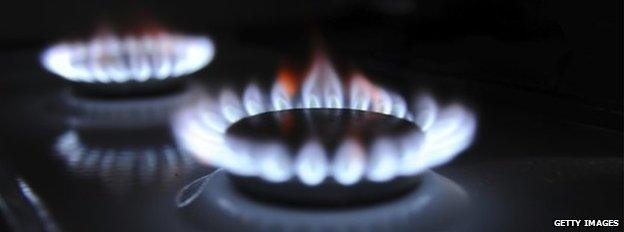Give Ofgem new powers on energy bills - Ed Miliband
- Published
Ed Miliband: ''Let's reduce energy bills for consumers... as well as having our freeze to guarantee that bills won't rise''
The energy regulator Ofgem should be given new powers to force firms to cut gas and electricity bills - to reflect falls in wholesale energy prices, Ed Miliband has said.
The Labour leader told Andrew Marr he would demand fast-track legislation on energy in a Commons debate next week.
Ofgem currently does not have the power to force a reduction in prices.
Trade body Energy UK said suppliers were already passing on price cuts to customers.
Wholesale energy costs have been dropping in recent months, with the price of a barrel of Brent Crude oil falling to below $50 this week.
'Immediate relief'
In an interview on the BBC's Andrew Marr Show, Mr Miliband said: "We do want to see those wholesale costs passed on to consumers.
"We're going to bring before the House of Commons a vote in Parliament to say the government should bring forward fast-track legislation to ensure that we give the regulator...the power to cut prices."
"We see wholesale costs go down 20% in gas prices over the last year and no reduction in bills."
The vote called by Labour which will be held during an opposition day debate on Wednesday would give Ofgem "the power to cut prices to bring immediate relief", Mr Miliband said.
He suggested that the necessary legislation could be pushed through Parliament before the general election on 7 May.
Chancellor George Osborne has launched a Treasury investigation into whether energy companies are passing on the savings from falls in the wholesale price of oil.
Mr Miliband said the government should "put their money where their mouth is".

Analysis

Joe Lynam, BBC News business correspondent
When energy prices were soaring in September 2013, Ed Miliband said the next Labour government would introduce a price freeze until 2017 on energy companies.
Yet since June last year, oil prices have gone down by 50% and wholesale energy prices have dipped by 30%. But the prices being paid by households to heat their homes have not fallen at anything like that speed.
That's partly because big energy companies bought up large quantities of oil and gas in advance - called "hedging" - at the higher prices to avoid being hit by a potential price freeze from May this year. So a political pledge - as opposed to actual legislation - has had the effect of sustaining prices at an artificially higher level than would otherwise be the case.
Now Labour wish to "double down". As well as its own pledge should it gain power, it is demanding new legislation from the coalition ahead of the election to allow Ofgem to force price cuts on big energy firms.
Ofgem currently doesn't have the power to set prices. All it can do is shout loudly if it feels that consumers are being overcharged.

A spokesman for Energy UK said no new powers were needed, adding: "Energy suppliers are already passing on price cuts to customers. With over 25 suppliers in the market, competitive pressure is forcing down prices every week.
"When people shop around they can easily find deals that are over £100 cheaper than this time last year and line with with falls in the wholesale energy price part of energy bills."
Ofgem said: "We've made it clear that we think energy suppliers should explain more clearly why the consistent fall in wholesale price hasn't fed through to consumer prices."
The Conservatives said Labour's energy policy was "in chaos" and that Ed Miliband was "late to the game".
"Ed Miliband has been saying he wanted to have an energy price freeze. If we had that freeze as he wanted prices would not have fallen as they have started to do now," Culture Secretary Sajid Javid told the BBC.
"He's running around looking for some new energy policy because the one he had before - the energy price freeze - has failed."
'Wage index'
In a wide-ranging interview, Mr Miliband discussed the terror threat following the Paris attacks, problems in the NHS and Conservative plans to make it harder to stage public sector strikes.
He also called for a new Living Standards Index to track how people's finances are affected by changes to wages, prices, taxes and benefits.
Mr Miliband has written to the UK Statistics Authority, suggesting this quarterly index should have equal status to other official measures.
Labour proposes the new indicator should be drawn up by the Office for National Statistics, and the Office for Budget Responsibility should be expected to issue LSI forecasts in the same way as it does for gross domestic product.
Mr Miliband earlier said: "We measure all kinds of things but the only thing we don't measure is the thing that matters most, and by which I will judge my government - the living standards of working people."
- Published25 November 2010
- Published15 November 2010